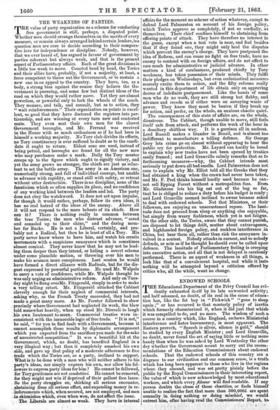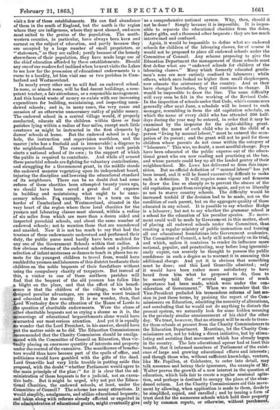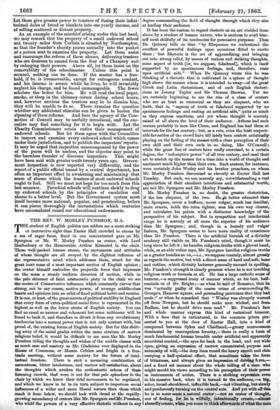ENDOWED 'SCHOOLS. T HE Educational Department of the Privy Council has
evi- dently exhausted itself by its late unwonted activity; and half ashamed, no doubt, of its zeal in the cause of educa- tion has, like the fat boy in " Pickwick " "gone to sleep. again ;" or has recurred to that masterly policy of inertia which formerly characterized it, when it did just that whirls it was compelled to do, and no more. The wisdom of such a. course in a country which, like England, eschews Ministerial interference and hates bureaucracy, is most apparent. The Eastern proverb, " Speech is silver, silence is gold," should be studied by every English Minister ; and Lord Granville,. no doubt, never found the art of saying little or nothing more handy than when he was asked by Lord Wrottesley the other day whether the Government meant to carry out the recom- mendations of the Education Commissioners about endowed schools. That the endowed schools of this country are a disgrace to our civilization and our common sense, is a truth which has long been apparent to those who live in the regions where they abound, and was set pretty plainly before the public by the Royal Commissioners in their interesting report, the value of which is now acknowledged by most educational workers, and which every fidneur will find readable. If any person doubts the abuse of these charities, or finds himself unable to realize the fact that more than 300,0001. are spent annually in doing nothing or doing mischief, we would entreat him, after having read the Commissionsrs' Report, to petent teacher, a fair attendance, or a responsible management. would be impossible to draw the line. The same difficulty And this horrid waste of money co-exists with our increasing will very soon be felt in the working of the Revised Code. expenditure for building, maintaining, and inspecting unen- In the inspection of schools under that Code, which commences dowed schools ; and is, in many cases, the very cause and generally after next June, a schedule will be issued to each occasion of an otherwise unnecessary outlay of public money. manager, resembling in form the old capitation schedule, on The endowed school in a central village would, if properly which the name of every child who has attended 200 half- conducted, educate all the children within three or four days during the year may be entered, in order that it may be parishes lying within a radius of four miles, except such little examined by the inspector for the eight-shilling grant. creatures as might be instructed in the first elements by Against the name of each child who is not the child of a dames' schools at home. But the endowed school is a dog- person " living by manual labour," must be entered the man- hole, the instruction and supervision worthless, and the potion of -its parent; and the grant will not be paid for those master (who has a freehold and is irremovable) a disgrace to children whose parents do not come within the category of the neighbourhood. The consequence is that each parish " labourers." This wag, no doubt, a most needful change. Boys starts a national school of its own ; to the support of which have been educated at the public expense out of the educe- the public is required to contribute. And while all around tional grant who are now readily, and practising at the bar, these parochial schools are fighting for voluntary contributions, and whose parents could buy up Al the landed gentry of their and straggling for a Government grant, in the middle stands neighbourhood. Mr. Lowe has delivered us from this impo- the endowed monster vegetating upon its independent hoard, sition. But no official definition of " manual labour" has yet injuring the discipline and lowering the educational standard been issued, and it will be found excessively difficult to make of its neighbours. There can he no doubt that had some such a definition. It will require some vigour and firmness reform of these charities been attempted twenty years ago, to draw the line so sharply as to prevent the abuses of the we should have been saved a great deal of expense old capitation grant from creeping in again, and yet so liberally in building and maintaining what ought to be unne- as not to starve country schools. The difficulty would be cessary schools. Pot example, there is a town on the increased tenfold if the decision had to be made, not on the border of Cumberland and Westmoreland, situated in the condition of each parent, but on the aggregate quality of those very heart of the region where these local charities for the educated in any school. It is possible to say whether Hodge yeomen and labouring classes most abound, within a radius is a labourer; but not to say whether the grammar school is of six miles from which are more than a dozen aided and a school for the education of his peculiar species. No move- inspected parochial schools, and about the same number of ment could well be made by Government in this matter, short .endowed schools ; not to mention those that are unendowed of placing all endowed schools under the Committee, thus and unaided. Now it is not too much to say that had the creating a regular ministry of public instruction and turning trustees of these endowments understood and performed their all our educational foundations into Government academies. duty, the public purse need hardly have been mulcted for The Committee of Council, a body still notoriously on its trial,, any one of the Government Schools within that radius. A and which, unless it contrives to render its influence more low obvious reforms of the endowed schools and a judicious national, popular, and penetrating, may before long ignomini- aelection of infant mistresses or dames to teach in places too re- ously expire, can scarcely be thought to possess the public mote for the youngest children to travel from, would have confidence in such a degree as to warrant it in assuming this enabledthe yeomen andlabourers of this district toeducate their additional charge. And yet it is obvious that something children on the noble bequests of their forefathers without must be done ; and this Lord Granville admitted ; only using the compulsory charity of taxpayers. But instead of it would have been rather more satisfactory to have this, a visitor to one of those northern parishes will heard from him what he proposed to do, than to find that the bequest of the old yeoman has fallen like be merely told that " several suggestions of much ommended that the Charity Commission should be am alga- missioners act, not by taking a direct initiative, but by stimu- ted with the Committee of Council on Education, thus vir- biting and assisting that movement which has already begun ally placing an enormous quantity of interests and property in the country. The late educational uproar had at least this under the control of the executive. The munificence of benefac- benefit, that it informed members of Parliament of the exist- tors would thus have become part of the spoils of office, and enee of large and growing educational efforts and interests ; politicians would have gambled with the gifts of the dead. and though those who, without sufficient knowledge, venture, Lord Granville had very little trouble in putting aside this like Mr. Papillon, at Colchester, to enter into detail, may proposal, with the doubt " whether Parliament would agree to talk nonsense and betray their ignorance, the example of Mr. the main principle of the plan :" for it is clear that the ad- Walter proves the growth of a new interest in the question of ministration of these bequests is for a judicial, not an, execu- education, which bids fair to create a regular sessional agita- tive body. But it might be urged, why not put the Educe- tion, and perhaps is destined to occupy the place of the aban- tional Charities, the endowed schools, at least, under the cloned reform. Let the Charity Commissioners aid this move- -Committee of Council ? The scheme has many attractions. It ment by allowing, when application is made to them, deeds to would simplify, amalgamate, and utilize educational bequests ; be simplified, copied, and enrolled ; and by issuing a form of and taken along with reforms already effected or expected in trust deed for the numerous schools which hold their property the administration of educational grants, might eventually give only by common repute, or otherwise, without parchment. visit a few of these establishments. He can find abundance us a comprehensive national system. Why, then, should it of them in the south of England, but the north is the region not be done ? Simply because it is impossible. It is impos- where they are indigenous, where they most abound, and seem sible to separate the educational charities from the doles, most suited to the genius of the population. The north- Easter gifts, and a thousand other bequests : they are too much western counties, in particular, have always been keen and intertwined and confused.
earnest on the subject of education, and partly because they Again, it would be impossible to define what are endowed are occupied by a large number of small proprietors, or schools for children of the labouring classes, for of course it " statesmen," as they are called ; partly because of the homely would not be proposed to place all endowed schools under the shrewdness of their population, they have made large use of Committee of Council. Any scheme proposing to give the the chief education afforded by these establishments. Should Education Department the management of these schools must any one of our readers feel inclined when henext visits the Lakes first define what arc " endowed schools for children of the to see how far the possession of educational endowments is a labouring classes." Many which formerly educated gentle- curse to a locality, let him visit one or two parishes in Cum- men's sons are now entirely confined to labourers ; while berland and Westmoreland. others, which once looked no higher than small shopkeepers, In nearly every other one he will find an endowed school. now educate the aristocracy of the country. And as they In none, or almost none, will he find decent buildings, a com- bare changed heretofore, they will continue to change. It blight on the place, and that the effect of his benefi- importance had been made, which were under the con- nee is that the children of the village, to which lie sideration of Government." When we remember that the signed peculiar advantages, are among the worst trained Vice-President preluded his tremendous reforms of last gee- d educated in the county. It is no wonder, then, that sion in just these terms, by praising the report of the Corn- ord Wrottesley drew the attention of the House of Lords to missioners on Education, admitting the necessity of alterations, e question of charitable endowments. Were the abuse of and concluding that he would not do anything to disturb the her charitable bequests not so crying a shame as it is, the present system, we naturally look for some hidden meaning scarriage of educational bequeatl1ents alone would have in the precisely similar announcement of his chief the other rranted our most serious attention. And yet it is equally day. We trust, however, that no attempt will be made to trans- wonder that the Lord President, in his answer, should have for these schools at present from the Charity Commissioners to t the matter aside as he did. The Education Commissioners the Education Department. Meantime, let the Charity Corn- Let them give greater power to trustees of fusing their infini- tesimal doles of bread or blankets into one yearly income, and of selling scattered or distant property.
As an example of the mischief arising under this last head, we may remark that the property of a small endowed school not twenty miles from Carlisle is situated by Northampton, so that the founder's charity passes annually into the pocket of a person sent to examine the property. Let them assist and encourage the reform of these abuses, delivering trustees who are desirous to amend from the fear of a Chancery suit by enlarging their powers. Above all, let them insist on the removability of the schoolmaster. Unless this point is secured, nothing can be done. If the master has a free- hold, if he is irremoveable, except for outrageous conduct, and his income is secure while he lives, he will invariably neglect his charge, and be found unmanageable. The fewer scholars the better for him. He will read the local paper, smoke, or sleep in the chimney- corner during school hours, and, however anxious the trustees may be to dismiss him, they will be unable to do so. There remains the question whether any additional stimulus can be given to hasten the ripening of these reforms. And here the agency of the Com- mittee of Council may be usefully introduced, and the exe- cutive may find something for it to begin with. Let the Charity Commissioners retain entire their management of endowed schools. Bute let them agree with the Committee to inspect and examine every endowed school which comes under their jurisdiction, and to publish the inspectors' reports. It may be urged that inspection unaccompanied by the power of the purse will be useless, and the objector may point to the harmless thunder of diocesan inspectors. This might have been said with greater truth twenty years ago. Govern- ment inspection is now reported very differently, and the report of a public official issued by a central department, has often an important effect in awakening and maintaining that sense of shame which the trustees of most endowed schools ought to feel. Still we must not hope for too much from this last measure. Parochial schools will continue slowly to drag up endowed schools by the principles of emulation and shame to a better level. But the Government system must itself become more national, popular, and penetrating, before it can pierce thoroughly the incrustations which centuries have accumulated round our educational endowments.
































 Previous page
Previous page